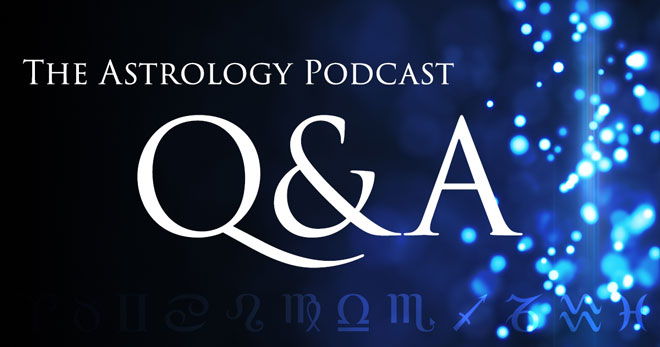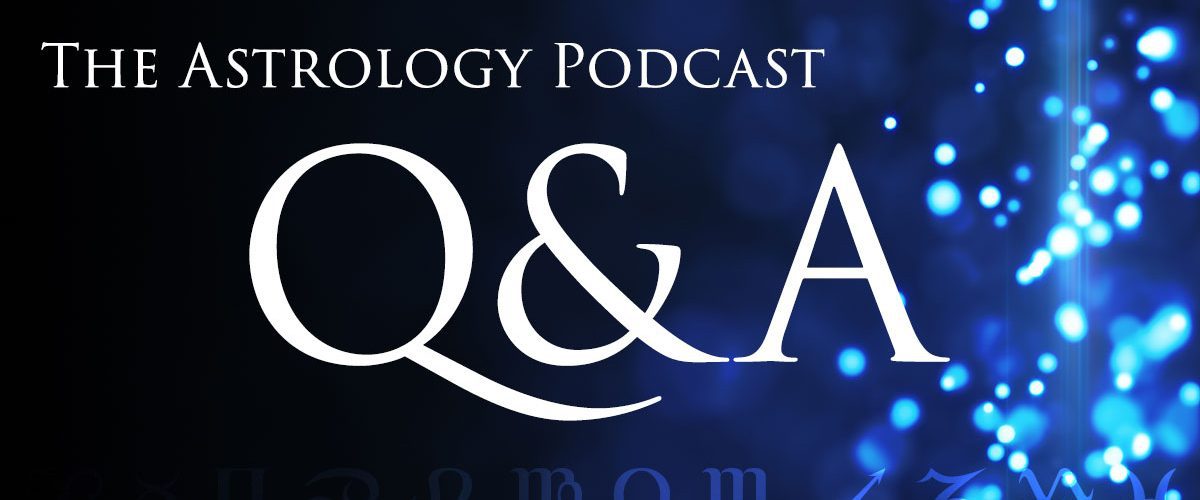
In episode 103 astrologer Kelly Surtees joins the show in order to help answer questions from listeners and patrons of the podcast on a variety of astrological topics.
We received so many questions for our last Q&A episode, which was episode 100, that we decided to do a followup show with just Kelly and Chris in order to get to the rest. In the end it took us about 2 hours, but we got through them all!
Below you will find the show notes, followed by links to download or stream the recording of this episode of the podcast.
Announcing Giveaway for April
At the top of this episode I announce the giveaway prizes for April:
- A pass to the upcoming Northwest Astrological Conference, which is taking place May 25–29, 2017 in Seattle, Washington. Discounted registration rates for NORWAC end on April 22, so sign up now for a lower price.
- A copy of Ben Dykes’ new translation of Dorotheus of Sidon, which will be released later this month.
For more information about the giveaway and how to enter see the April description page.
Episode Outline
Here are shortened versions of some of the question topics that we talked about during the course of the episode:
- What are the different branches and traditions of astrology? See also episode 29.
- How do you reconcile different schools and approaches that disagree with each other?
- How do you deal with the myriad of new astronomical findings?
- Where do you see astrology headed professionally and publicly in the future?
- Do you look at secondary progressions or transits when picking an election?
- How do New Moons and the concept of under the beams relate to elections and starting new projects?
- Did ancient and traditional astrologers use relocated charts?
- How are planetary speed and stations used as interpretive principles?
- Kelly has an article on planetary speeds and astrology on her website, as well as a lecture where she discussed the topic a bit in relation to other inquiries.
- What are some of your reasons for believing in the validity of astrology?
- What are the strongest arguments against the validity of astrology?
Thanks to all of our patrons who sent in questions!
Transcript
A full transcript of this episode is available: Episode 103 transcript
Listen to This Episode
You can either play this episode of the podcast directly from the website or download it as an MP3 to your computer by using the buttons below:
Podcast: Play in new window | Download (Duration: 2:14:32 — 108.1MB)


Hello Chris! I’m a first-time listener, but I so enjoyed the podcast!
I noticed you mentioned wanting to speak with people going through their first Saturn returns (with the Uranus conjunct). I’m one of them, and some of my clients and yoga students are as well.
If you’d like to chat about this interview project of yours, I’d be happy to be in touch via email. I’m a professional folklorist, so interviewing to find data is one of my favorite pastimes. 🙂
Great podcast!
That would be great! Maybe we could touch base later this year once we get closer to Saturn finishing up its transit through Sagittarius, and by then most of the different Saturn return stories should be getting wrapped up.
Hey Chris, in regards to the final question to do with astrology and validity: the most recent Skeptico episode is all about it.
skeptiko.com/renay-oshop-peer-reviewed-astrology-345/
That was pretty bad, although it kind of just reinforces some of the comments that I made in response to this question, and demonstrates why I made them.
Skeptico is reasonably fair at giving every guest a rough ride, which is fine – it’s just a shame it was an astrologer this time around. I think her research is fascinating – and really good – and I even think the host is at least astrology-friendly. He wraps the interview in bluntness, which seems to invalidate Renay’s research unjustly. I have to admit, I still have high hopes for astrology and fringe science.
Lovely job, y’all. Those were great questions and great responses.
Kelly, your bit on planetary speeds was fascinating and inspirational. I might add that one can very easily pull up planetary speeds for a chart on astro.com. There is a link that says “Additional tables (PDF)” that gives the longitude, house, speed, latitude, and declination of all the planets in a chart. This along with the table you posted makes identifying fast and slow moving planets easy as pie.
For clarity, the link I’m referring to is on the upper left hand of the actual natal chart above the native’s birth information.
Comments of “scientific” validity. There is a great deal of difference between what is really scientifically valid and what is scientifically accepted. Take for instance the scientifically accepted goodness of the low fat diet which has now, with more investigation turned out to be very bad for your health. My body told me that butter was good, whole milk and cheese was good and low and behold my body was correct.
I think it is a big mistake for anyone to be guided by what is accepted collectively. The collective has a high incidence of accepting real bunk and lots of falseness: Slavery is good for the enslaved, the earth is the center of the solar system, plate tectonics is bunk, cigarettes are good for you, etc. ect. etc. If you have some good knowledge and experience with a system and your experience shows you that it is useful just ignore all the nay sayers. History has shown that they are most likely the ones who have it wrong.
Science is notorious for have lots of trouble accepting and investigating new theories. It is well know that you have to wait for the group of older scientists who have built their careers on a given theory to die for the newer theory to get air space for full exploration. I think it is a good thing that Astrology lives in its own realm off to the side of the accepted collective. This gives it space to grow and develop based on serious users. I also don’t think that licensing helps professions. Look at all the licensed psychiatrists and doctors who have sex with their patients, sell drugs, rip off medicare and on and on and one. Licensing often gives the bad guys an easy way to be accepted. People accept the license and don’t do close evaluation of the person.. I have spent most of my life going to people who provide non standard health care and psychological services and I have always found them to to provide usually better care than the standard process. People who don’t rely on a license for a credential have to provide excellent service to keep their clients. If they don’t then people will no return to them nor will they recommend them to others. There is no way to provide 100% excellence, but I think that this is a good business model for weeding out the bad apples.
More on who needs to accept Astrology. At the 2016 ISAR conference I was struck by how many of the presenters made their livings as professional Astrologers because they dealt with wealthy clients. Then it dawned on me that Astrology has always been primarily connected to the rich and ruling class. It was the king who had a court Astrologer, not the baker. People of wealth and power don’t spend their time with things that don’t work. That is how they get to be rich and powerful in the first place. Maybe we should just look at who the users of Astrology are and judge the validity and usefulness of it by the type of people who use it regularly rather than on any collective acceptance. The wealthy very often use information and techniques that the average person does not and this is what gives them their advantage over the crowd.